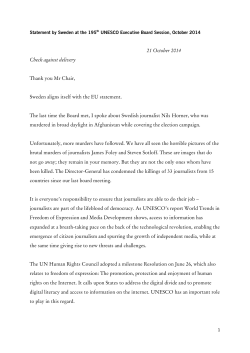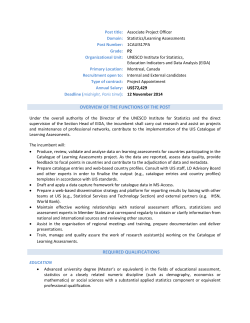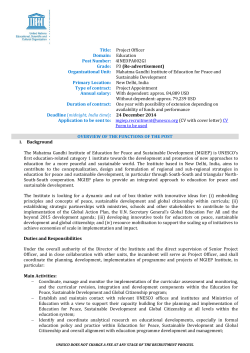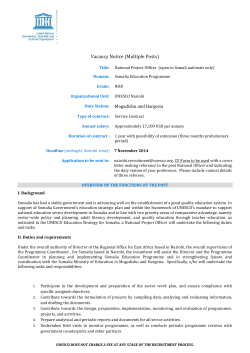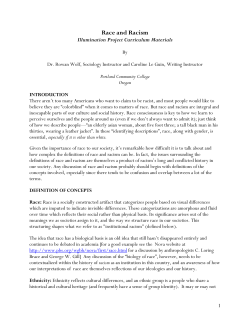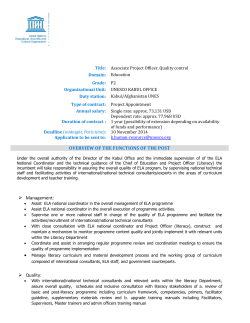
I D “
PUBLICATIONS INTERNATIONAL DAY FOR TOLERANCE 16 November 2014 “In a globalizing world, it is no longer enough to live side by side, in passive indifference – tolerance requires active vigilance, renewed each day, against xenophobia, discrimination and hatred.” ➥ A Selection of UNESCO publications on Tolerance and related themes Source: message by Ms Irina Bokova, Director-General of UNESCO on the occasion of the International Day for Tolerance, 16 November 2014 / Arabic, Chinese, English, French, Russian, Spanish UNESCO-MADANJEET SINGH PRIZE FOR THE PROMOTION OF TOLERANCE AND NON-VIOLENCE UNESCO-Madanjeet Singh Prize for the Promotion of Tolerance and NonViolence The UNESCO-Madanjeet Singh Prize for the Promotion of Tolerance and Non-Violence rewards significant activities in the scientific, artistic, cultural or communication fields aimed at the promotion of a spirit of tolerance and non-violence. The Prize was established in 1995 on the occasion of the United Nations Year for Tolerance and the 125th anniversary of the birth of Mahatma Gandhi. It was also the year when UNESCO Member States adopted the Declaration of Principles on Tolerance. The creation of the Prize has been inspired by the ideals of UNESCO’s Constitution that proclaims that “peace, if it is not to fail, must be founded on the intellectual and moral solidarity of mankind”. Tolerance recognizes the universal human rights and fundamental freedoms of others. People are naturally diverse; only tolerance can ensure the survival of mixed communities in every region of the globe. In recognition of a lifelong devotion to communal harmony and peace, the Prize bears the name of its benefactor Madanjeet Singh, who was a UNESCO Goodwill Ambassador, Indian artist, writer and diplomat. Awarded every two years, on the occasion of the International Day for Tolerance (16 November), the Prize is marked by a ceremony and the winner is presented with the sum of US$ 100,000. Laureates of the 2014 edition: Ibrahim Ag Idbaltanat (Mali) and Francisco Javier Estevez Valencia (Chile) UNESCO-Madanjeet Singh Prize for the Promotion of Tolerance and Non-Violence – Statutes 2014. 6 p. SHS/2014/PI/H/1 Also available in French UNESCO-Madanjeet Singh Prize for the Promotion of Tolerance and Non-Violence 2009. 20 p. SHS.2009/WS/18 Also available in French The Sasia Story A story told by the Indian artist, writer, diplomat and philanthropist, Madanjeet Singh, and dedicated to the young people of South Asia. 2005, 92-3-103992-x (En), 92-3-203992-3 (Fr), 92-3-303992-7 (Sp), 223 p. Also available in French and Spanish Contact: m.abderrahmane@unesco.org 2 THE BOUBA AND ZAZA SERIES ON TOLERANCE The Bouba and Zaza series Childhood Cultures, an intergenerational African series of children's books, freely examines serious subjects. Its stories are set in contemporary African society and portray early childhood and its problems. The publishers have adopted an educational approach, using fiction to examine the questions children may ask themselves and the answers they need. Among the themes chosen are: AIDS; Children in an emergency situation (sexual abuse); The culture of peace and non-violence (scars left by war); Accepting difference, tolerance (living with a disability); Children faced with natural disasters; Protection of the environment; Identity, cultural identity; Remembering to say “thank you”; Respect for elder people and respect for each other; The importance of water; Safety, protection (the dangers of the street and domestic risks); Hygiene, health and diet. The concept of Bouba and Zaza was developed by ADEA's Working Group on Early Childhood Development and UNESCO's Regional Office in Dakar, in collaboration with education specialists in Africa from ADEA (Association for the Development of Education in Africa) and UNESCO, the Publisher Michel Lafon Education and African illustrators. Bouba & Zaza accept people's differences 2011, 978-92-3-104214-0 (En); 978-92-3-204214-9 (Fr); 978-92-3-704214-4 (Por), 16 p. Available in English, French (Bouba et Zaza acceptent la différence) and Portuguese (Bouba & Zaza aceitam as diferenças) Bouba and Zaza make peace 2011, 978-92-3-104217-1 (En); 978-92-3-204217-0 (Fr), 16 p. Available in English and French (Bouba et Zaza cultivent la paix) Bouba and Zaza find out the truth about AIDS 2011, 978-92-3-104216-4 (En); 978-92-3-204216-3 (Fr), 16 p. Available in English, French (Bouba et Zaza découvrent la vérité sur le SIDA) and Portuguese (Bouba & Zaza descobrem a verdade sobre a SIDA) Contact: m.abderrahmane@unesco.org 3 HIV AND AIDS: TACKLING HIV-RELATED STIGMA We are all in the same boat! Using art and creative approaches with young people to tackle HIV-related stigma Stigma is a daily reality and a major cause of suffering for people living with HIV. They face many forms of stigma, such as: being blamed and shamed at home and in some cases forced to leave home; losing friends and being forced to drop out of social groups and activities; finding it difficult to keep jobs and rent accommodations; being mistreated at clinics and having difficulty accessing health services. Children in HIV affected households also face stigma – they may be badly treated by their extended family or the family that decides to take them in, they may face verbal and physical abuse and may be forced to drop out of school. Stigma stops people living with HIV from disclosing their HIV status to their families and close friends, from getting tested and from getting care and treatment. Stigma particularly affects women, the poor and young people, who have fewer resources for coping with stigma. This toolkit main aim is to educate young people about HIV stigma and discrimination and build their skills, confidence and commitment to act against stigma. 2010, UNESCO/CLT/CPD/CPO/2010/PI/157; CLT-2010/WS/11, 91 p. Also available in Portuguese (Estamos todos no mesmo barco!) HIV/AIDS and Human Rights: young people in action; a kit of ideas for youth organizations This kit presents ideas for youth action on human rights and HIV/AIDS. It was prepared in close consultation with young people from various youth organizations, in particular with students from the International Federation of Medical Students’ Association and from the International Pharmaceutical Students’ Federation. 2001, SHS-2006/RSP/RAC/1, 68 p. Also available in French, Spanish and Russian Poner fin al estigma y a la discriminación relacionados con el VIH-Sida: cuaderno metodológico para sensibilización y capacitación Esta publicación es uno de los resultados de un Proyecto desarrollado por la UNESCO en Bolivia, Ecuador y Perú sobre el tema del estigma y de la discriminación relacionados con el VIH-Sida . Constituye un recurso educativo que fue validado en los diferentes talleres realizados en los países participantes en el Proyecto. 2011, ED/EC/2012/PI/H/1, 102 p. The Principle of non-discrimination and entry, stay and expulsion of foreigners living with HIV/AIDS. International Journal on Multicultural Societies, Vol. 11, No. 1 2009. 1817-4574. p. 91-102 (Electronic version only) Contact: m.abderrahmane@unesco.org 4 HIV and AIDS: what can we do about this? Other, Others, Otherwise Series Published in English and Russian, with the support of the UNESCO Office in Moscow, the charity foundation “Tolerance Institute” and the Rudomino AllRussia State Library for Foreign Literature, this illustrated work main aim is to help children from 10 to 13 years old to become more aware about HIV/AIDS and to help prevent the discrimination that can affect persons living with HIV/AIDS. 2009, 978-5-904460-02-0, 74 p. Also available in Russian Social Science Perspectives on HIV/AIDS. . International Social Science Journal - N° 186 Viruses too are social phenomena. That may sound like a joke or a paradox, but it simply reflects the fact that relating to illness is a constitutive part of the human condition. Because the ways in which HIV/AIDS is transmitted are heavily fraught with symbolism, the pandemic underlines with special force the essential nature of epidemiology as a social science. This issue offers three main angles on HIV/AIDS: the beliefs, attitudes and behaviour that shape, promote or hinder the epidemic; the political, ethical and economic issues raised by prevention and treatment; policy responses and the necessary role within them of the human rights of people living with HIV and AIDS. It includes case studies covering a wide range of countries, from Vietnam to Albania and from China to Angola. 2005. 0020-8701, p. 591-755. Also available in Arabic, Chinese and French Babiza's Story. Indaba kaBabiza. By children for children series, No. 1 Babiza is a nine-year-old boy in a peri-urban area of KwaZulu-Natal, South Africa, whose mother is HIV positive. He tells his family’s story forthrightly, sharing his hopes and fears and the strength he has gained by reaching out to his family, friends and a support group organized by the local hospital. The text is in English and Zulu, with photographs of Babiza and his community and colour drawings by the young author himself. 2004. 0-620-33140-2, 33 p. Bilingual English/Zulu Stop AIDS discrimination: Youth Initiative on HIV/AIDS and Human Rights 2001 (En), 2006 (Fr), SHS.2005/WS/47 (Fr), 11 p. (brochure) Also available in French Literature review on HIV and AIDS, education and marginalization Background paper for the Education for all global monitoring report 2010: Reaching the marginalized 2009, 2010/ED/EFA/MRT/PI/31, 61 p. More information on UNESCO's response to HIV and AIDS Contact: m.abderrahmane@unesco.org 5 FIGHTING AGAINST RACISM, DISCRIMINATION AND EXCLUSION Teaching respect for all: implementation guide 2014, 978-92-3-100025-6 (En), 978-92-3-200032-3 (Fr), 301 p. Also available in French (Enseigner le respect pour tous : guide de mise en oeuvre) Education and democratisation: tolerance of diversity, political engagement, and understanding of democracy 2013, 2014/ED/EFA/MRT/PI/03, 61 p. Dialogue among Endogenous Religions, Christianity and Islam in the Service of the Culture of Peace in Africa. Proceedings of the international symposium, Cotonou, 20-21 August 2007 / Le Dialogue entre les religions endogènes, le christianisme et l'islam au service de la culture de la paix en Afrique. Actes du colloque international, Cotonou, 20-21 août 2007 2009, AFR.2009/WS/1, 501 p. Guidelines for educators on countering intolerance and discrimination against Muslims: addressing islamophobia through education The attitudes and tensions that lead to inter-communal conflict are often deeply rooted in stereotypes and misconceptions, and one of the most pressing contemporary challenges is to promote knowledge about, and understanding of, different cultures. Educators play a fundamental role in meeting this challenge. 2011, 978-92-9234-816-8; 978-92-9234-820-5 (Rus) Also available in Russian International Day against Homophobia & Transphobia (IDAHO): lesson plan 2014, BEJ/2014/PI/H/2, 15 p. Available in English and Chinese Lesson plans for teaching about sexual and gender diversity in Thailand 2014, THA/DOC/HP2/14/015-E, 19 p. Available in English and Thai Visit our website on Homophobic Bullying All equal in diversity: mobilizing schools against racism, discrimination and exclusion (campaign kit) Despite countless efforts, racism, discrimination, intolerance and exclusion still prevail in most societies. Breaking the Silence: the Transatlantic Slave Trade (TST) Education Project, carried out since 1998 by the UNESCO Associated Schools Project Network (ASPnet), tried to provide an answer. Some 100 schools in Africa, the Americas/Caribbean and Europe participate in the TST Education project. Their opinions and commitment have formed the basis of the “All Equal in Diversity” International Campaign. By deepening their understanding of the past, these schools work towards a better understanding of the present so as to build a brighter future based on mutual respect and unity in diversity, thus contributing substantially to the quality of education in the twenty-first century. 2005, + 1 CD-ROM and 1 poster. Also available in French Contact: m.abderrahmane@unesco.org 6 Combating Racism (leaflet, 29th week (27/03 – 01/04/2006) of the 60th anniversary of UNESCO) Faced with the rise in racist actions, UNESCO places the fight against all types of intolerance at the heart of its mandate. It contributes to drafting standard setting tools and operational projects. Also available in French Why racism? UNESCO Courier; 52 p. September 2001 Once founded on the traditional notion of “race”, racial discrimination today comes in many guises, whether based on one’s color, nation (xenophobia), ethnic belonging or caste. This dossier looks at its roots and impact on indigenous groups and black communities in Latin America, the lowest castes in Asia, and foreigners in Africa and Western Europe. Echoing the World Conference against Racism (Durban, South Africa, August 31-September 7), we strive to give a voice to the hundreds of millions of victims around the world. A Return to nature - p. 36-37. Also available in French and Spanish The Rise and fall of the laboratory racist - p. 21-23. Also available in French and Spanish Stuck at the gate of paradise - p. 24-26. Also available in French and Spanish Race, science and society. The Race question in modern science 1975, 92-3-101155-3; 92-3-101079-4 (paperback); 0-04-301073-3; 0-04-301000-0 (paperback); 0-231-03908-5; 0-23103910-7 (paperback) Four statements on the race question 1969, COM.69/II.27/A Also available in French and Spanish Race and Prejudice UNESCO Courier; 36 p. April 1965 “Racism is the expression of a system of thought which is fundamentally anti-rational. Hate and racial strife feed on scientifically false ideas, and live on ignorance? They can also derive from scientifically sound ideas which have been distorted or taken out of context, leading to false implications. To demonstrate these errors of fact and reasoning, and to spread knowledge of the conclusions reached by different scientific disciplines; UNESCO convened in 1946 a meeting of scientists from different countries to draw up a declaration on the nature and significance of racial differences. The text prepared by these experts and published by UNESCO in 1950 was well received by the public, but drew some criticism from anthropologists and geneticists who considered that it caused confusion between race as a biological fact and the idea of race as a social phenomenon” (by Georghi F. Debetz). Also in French Racism is Mutant – p. 9-10. Also available in French and Spanish The Ubiquitous Shadow of Racism Also available in French and Spanish (2008) In defence of Durban: racism is back on the agenda - p. 10-12 Also available in French and Spanish (2001) White fortresses in cyberspace - p. 44-46 Also available in French and Spanish (2001) Garlic, knives and banners: a tricolour triumph? - p. 40 Also available in French and Spanish Garlic, knives and banners: football's racist faces - p. 38-39 Also available in French and Spanish (2000) Gypsies: trapped on the fringes of Europe - p. 38-40 Also available in French and Spanish (2000) Contact: m.abderrahmane@unesco.org 7 Racismo e discurso na América Latina The main theme of the book is the racist speech inlaid and disguised in Brazilian social practice and in other countries of the American Continent. Camouflaged by tenuous euphemisms, the term "racism" is considered inappropriate by those who try to hide it under the social inequality phenomenon. What can be observed today is that racism exists and many of its subjacent prejudices and ideologies are acquired, confirmed and exercised through speeches. In a time of discussion of integration of important parts of marginalized populations through education, it turns essential to identify the barriers that hamper this inclusion. 2008, 978-85-7244-367-8 Forms and Patterns of Social Discrimination in Nepal. A report UNESCO Kathmandu series of monographs and working papers, no. 8 This report, which deals with socio-cultural diversity, was prepared within the framework of UNESCO’s programme on “Fight against all Forms of Discriminations” as part of the subregional programme on “Discriminations related to Caste, Class, Gender, Religion and Ethnicity in Asian Societies” initiated by the UNESCO Office in Islamabad. 2006. KAT-SHS2006/01 Affirmative Action. International Social Science Journal - N° 183 Action against racism and discrimination is central to contemporary perspectives on human rights and social justice. Yet while policy makes extensive use of vocabulary and even of concepts derived from social science, considerable uncertainty remains among specialists about the basis, implications and practical effects of policy measures that have become routine. From this perspective, affirmative action is of central significance. It appears to be a matter of straightforward common sense that specific remedial measures should be targeted at the victims of discrimination. In fact, a comparative analytical perspective shows how complex are the issues at stake and how simplistic or even misleading common sense can be. 2005 Remembering Slavery. International Social Science Journal - N° 188 Everyone is in some sense the heir, however indirect, to the Atlantic slave trade, which played a major role in structuring the modern world economic system and had effects far beyond those who directly suffered or profited from it. What does this legacy entail today? This issue sketches some connections between understanding the past and making sense of the contemporary politics of memory. It thereby helps to open a space for debate on a future in which the memory of slavery can be an aspect of self-understanding. 2006 Public service podcasting: a series of video clips on human rights, peace, tolerance and the fight against discrimination 2007, 1 DVD (26 min.) + 1 brochure Contact: m.abderrahmane@unesco.org 8 The International Coalition of Cities against Racism The International Coalition of Cities against Racism is an initiative launched by UNESCO in 2004 to establish a network of cities interested in sharing experiences in order to improve their policies to fight racism, discrimination, exclusion and intolerance in all their forms. The cities participating in the coalition commit themselves to two principles: adherence to an ethical and political Charter; and adoption and implementation of a Ten-Point Plan of Action. In order to respect the specificities and priorities of the different areas of the world, a regional approach has been adopted. Networks have been set up in Europe, Asia and the Pacific, North America and Africa, Latin America and the Caribbean. The Ten-Point Plan of Action. A showpiece The Ten-Point Plan of Action is at the heart of the Coalition principles. It consists of ten commitments to strengthen vigilance against racism, to encourage programmes of equality with regard to employment, to provide better support to victims of racism, and for policy evaluation. When they join the coalition, cities agree to integrate this Plan of Action into their municipal strategies and policies. They also agree to devote human, budgetary and material resources to the execution of the Plan of Action, as well as involving civil society actors in its implementation. 1. 2. 3. 4. 5. 6. 7. 8. 9. 10. Greater vigilance against racism Assessing racism and discrimination and monitoring municipal policies Better support for the victims of racism and discrimination More participation and better informed city dwellers The city as an active supporter of equal opportunity practice The city as an equal opportunities employer and service provider Fair access to housing Challenging racism and discrimination through education Promoting cultural diversity Hate crimes and conflict management. European Coalition of Cities Against Racism [2011; SHS.2008/WS/6 REV.]. Also available in French تحالف الفونسكا نافدناالالفية وا الااالفيسواةو انلفتنووايان ةلاوا اللتلسا انلفتيواAlso available in French - Coalition des villes arabes contre le racisme, la discrimination, la xénophobie et l'intolérance [2009, SHS/2009/PI/H/1] Coalition of Latin American and Caribbean Cities against Racism, Discrimination and Xenophobia [2008. SHS/2008/PI/H/3] Towards an Inclusive Society: Coalition of Cities against Discrimination in Asia and the Pacific [2006. TH/2006/PI/H/8 REV.] Coalition africaine des villes contre le racisme et la discrimination [2006] [Plan d'action en dix points de la Coalition africaine des villes contre le racisme et la discrimination, adopté à Nairobi, le 20 septembre 2006 [SHS/2008/PI/H/5, 2008] Plan d'action en dix points de la Coalition africaine des villes contre le racisme et la discrimination, adopté à Nairobi, le 20 septembre 2006 [SHS/2008/PI/H/5, 2008] Contact: m.abderrahmane@unesco.org 9 Fighting Racism and Discrimination: identifying and sharing good practices in the International Coalition of Cities This report features more than 50 good practices more than 38 cities of the Coalition have adopted to prevent and combat racism and discrimination. The purpose of this good practices report is two-fold. First, it draws together a collection of good practices in anti-discrimination of Member Cities so that they can inspire and inform the policies and practices of other cities. Second, it uses major themes related to the different roles and domains of cities to inform and, indeed, encourage critical reflection on antidiscrimination work in these areas. By reflecting on the reasons why each practice works, the report shows the applicability of the initiatives and the potential for their transferability to another jurisdiction. 2012, 978-92-3-001093-5 Study on Challenges in the Development of Local Equality Indicators: a human-rights-centered model. Commitment 2 of the Ten-Point Plan of Action International coalition of cities against racism. Discussion papers series, no. 5 The International Coalition of Cities against Racism is an initiative launched by UNESCO in order to network cities committed to counteract discrimination and exclusion. A series of studies have been carried out to collect and analyze practices and cases. The Discussion Paper Series presents the results of these studies and aims at assisting municipalities in better formulating policies and stimulating the debate in this area. 2010, 978-92-3-104171-6 Previous titles in this series Un lexique du racisme: étude sur les définitions opérationnelles relatives au racisme et aux phénomènes connexes (1, 2006) Study on measures taken by municipalities and recommendations for further action to challenge racism through education (2, 2006) Indicators for evaluating municipal policies aimed at fighting racism and discrimination (3, 2005) Study on measures taken by municipalities and recommendations for further action to achieve greater vigilance against racism: Commitment 1 of the Ten-Point Plan of Action (4, 2006) Canadian Coalition of Municipalities Against Racism and Discrimination. Toolkit summary This Toolkit is designed to be used by municipalities that have already joined the Coalition, those considering joining, as well as by community organizations and citizens encouraging participation by their municipality. It is designed to be user friendly, adaptable to local communities’ needs and helpful to municipalities at all stages of their CCMARD (Canadian Coalition of Municipalities Against Racism and Discrimination) involvement. 2012; 978-0-98112046-8-0 Contact: m.abderrahmane@unesco.org 10 The World Conference against Racism, Racial Discrimination, Xenophobia and Related Intolerance Durban - 31 August-South Africa 7 September 2001 Strengthening the Fight Against Racism and Discrimination: UNESCO's achievements from the 2001 World Conference Against Racism, Racial Discrimination, Xenophobia and Related Intolerance to the 2009 Durban Review Conference The Durban Review Conference provided UNESCO with a first important opportunity to communicate on the results achieved by the Organization in the fight against racism and all forms of discrimination over the last seven years. This document aims to present an overview of the concrete action undertaken by the Organization in all its fields of competence since 2001, including information on specific responses to the Durban Programme of Action. 2009, SHS.2009/WS/12 Also available in French Struggle against discrimination. Studies on human rights Series This book explores some of the central themes linked to racism, xenophobia and discrimination. Three years after the Durban World Conference on Racism (2001), in which UNESCO played an active part, these phenomena remain at the center not only of current affairs but also of the overall Human Rights debate. (2004) UNESCO against Racism Because racism, racial discrimination, xenophobia and related intolerance are so often the causes of war in the minds of men, UNESCO has always placed the struggle against racism at the heart of its action. Over the years, we have set standards, encouraged dialogue and mutual understanding, and conducted research in the social and human sciences; above all, we have endeavored to inculcate the values of human rights, non-discrimination, peace, democracy, tolerance and international understanding through education. (2001) Also available in French United to combat racism: selected articles and standard-setting instruments The struggle for the elimination of all forms of discrimination conducted by the United Nations system from the moment of its creation is a very important element in the efforts of the international community to assure full implementation and observance of human rights. Racial discrimination, violation of rights of persons belonging to vulnerable groups, minorities, indigenous people, immigrant workers or aliens should be also seen as the cause for serious conflicts and danger for international peace and stability. As the Preamble of the Universal Declaration of Human Rights states: “…recognition of the inherent dignity and of equal and inalienable rights of all members of the human family is the foundation of freedom, justice and peace in the world ”. 2001. SHS.2001/WS/11 Visit our webpage on the International day for the Elimination of Racial Discrimination Contact: m.abderrahmane@unesco.org 11 Human rights in perspective Human rights: questions and answers (6th updated edition) The new updated edition maintains the structure of the previous ones. The first part of the book presents an overview of the scope and content of international human rights law, procedures to monitor its implementation, organizations and institutions working for human rights, major international events, as well as new developments and challenges. The second part offers a brief commentary on the articles of the Universal Declaration of Human Rights explaining their meaning and providing examples on their practical implications. A permanent feature of this publication, and one of the reasons of its success, are the cartoons of Plantu, a well-known French political cartoonist and a devoted human rights activist. 2012, 978-923-104238-6 (En). Also available in Greek and Korean. (First published in 1981 and updated several times and translated into over 30 languages; the 5th edition exists in English, French, Arabic, and Korean) Empowering the poor through human rights litigation. Manual This publication, presented as a pedagogical tool, aims to guide grassroots organizations as well as state authorities in their work to eradicate poverty, by clarifying the core content and the range of human rights through landmark examples of justiciability in order to support actions that share knowledge, reduce deprivation and preserve human dignity . 2011, 978-92-3-001027-0 (En); 2012, 97884-934779-4-3 (Sp). Available in English and Spanish Democracy and human rights in multicultural societies This book examines the political governance of cultural diversity, and more specifically how public policy-making has dealt with the claims for cultural recognition that have increasingly been expressed by ethno-national movements, language groups, religious minorities, indigenous peoples and migrant communities. Its main objective is to understand, explain and assess public-policy responses to ethnic, linguistic and religious diversity. Adopting interdisciplinary perspectives of comparative social sciences, the contributors address the conditions, forms, and consequences of democratic and human-rights-based governance of multi-ethnic, multi-lingual and multi-faith societies. 2007, 978-92-3-104050-4 Human rights in education, science and culture. Legal Developments and Challenges Conceived from an international human rights legal framework, this book combines insights into the content, scope of application and corresponding state obligations of these rights with analyses of issues relating to their implementation. It presents the principles of the indivisibility, interrelatedness and interdependence of all human rights and turns to questions related to economic, social and cultural rights, including their justiciability, their application between private parties and the development of indicators for measuring their implementation. It also addresses the right to education, the right to enjoy the benefits of scientific progress and its applications, and the right to take part in cultural life – the content and scope of application of the latter two rights being in need of further elucidation. This issue is dedicated to the Sixtieth anniversary of the Universal Declaration of Human Rights. 2007, 97892-3-104073-3 A guide to human rights. Institutions, standards, procedures Providing brief information on major instruments, procedures and mechanisms to protect human rights, principal events (international conferences, decades, years, days, etc.), and institutions dealing with human rights, this volume has 600 entries and is designed for all those who are concerned about, and interested in, human rights, primarily educators, students, human rights activists and mass media professionals. It provides the reader with a better understanding of the international system of promotion and protection of human rights, based on international human rights law. 2003, 978-92-3-103928-7 Human rights: international protection, monitoring, enforcement This volume takes an institutional approach to the international protection of human rights. It examines the United Nations system and analyses regional systems of protection. It is an indispensable source of information on the protection of human rights and a practical guide to the use of existing procedures in the defense of human rights. 2003, 978-92-3-103883-9 Contact: m.abderrahmane@unesco.org 12
© Copyright 2025
